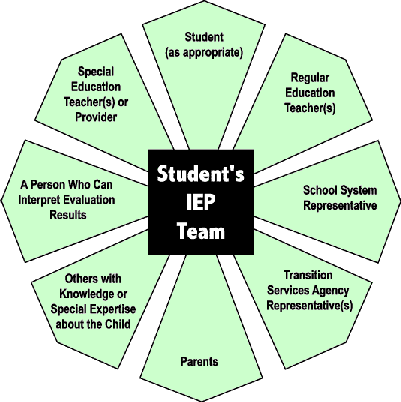The IEP Team Members
The Federal law, called Individuals with Disabilities Education Act (IDEA) defines
the "IEP team" as a group of people who are responsible for developing,
reviewing, and revising the IEP (Individualized Education Program) for
a student with a disability. By law, these people include:
This wheel of IEP Team members, is from US Department of Education, Laws & Guidance, Special Education & Rehabilititive services.
Who Participates in IEP Team Meetings?
- The parents of the student
- The student, as appropriate (In Mass. student is invited to attend at age 14.)
- At least one regular education teacher of the child, if the student is (or might be) participating in the general education environment.
- At least one special education teacher or provider.
- A representative of the local public agency (i.e. School Principle, School Administrator) who:
- knowledgeable about specially designed instruction for students with disabilities,
- the general curriculum,
- the availability of local public agency resources.
- Someone who can interpret the instructional implications of evaluation results (i.e. School Psychologist, Special Educator Teacher, Speech and Language Pathologist, etc.) who may be another team member.
- Other people whom the parents or the school have chosen to invite, who have knowledge or special expertise regarding the child, including related service.
Collectively, the IEP team members should be knowledgeable about:
- The student, available services
- External and internal sources of assistance
- The IEP process
IDEA reg. 300.321 - IEP Team
Your child's IEP is written by this Team.
The Team works together, collaborates, and decides by consensus not by vote.
Everyone on the team has an equal voice.
"Parents are equal partners in the Team process.
The Team process should be a collaborative process between parents, school staff members
and other professionals. Parents have a unique and critically important perspective on their
child’s learning style, strengths and needs. The school staff should ensure that parents feel
welcomed and comfortable when communicating with school staff and at all meetings.
Parents have the right to be involved in meetings that discuss the identification, evaluation, IEP
development and educational placement of their children. The law ensures that parents and
school personnel are equal partners in all steps during the Team process.
Every effort should be made to resolve differences between parents and school staff through
informal measures. Respect parents’ right to disagree while looking for common goals and
interest between a parent’s requests and the school’s position. Make sure you listen carefully
to all proposals and understand the major issues involved. Brainstorm possible alternative
solutions and offer reasonable compromises keeping the needs of the student central to your
discussions and your negotiated agreements.
The Team should always work toward consensus. However, school personnel ultimately have
the responsibility to ensure that the IEP includes the services that the student needs. Schools
districts are, by law, obligated to make a proposal to the parent."
From page 3 of the IEP Process Guide (June 2001), is a manual that was publication by DOE, that describes each page of the IEP and the Team Process.
New addation with IDEA 2004
IEP team attendance.
(i) Attendance not necessary.
A
member of the IEP Team shall not be required to attend an IEP meeting,
in whole or in part, if the parent of a child with a disability and the
local educational agency agree that the attendance of such member is
not necessary because the member's area of the curriculum or related
services is not being modified or discussed in the meeting.
(ii) Excusal.--A member of the IEP Team may be excused from attending an IEP meeting, in whole or in part, when the meeting involves a modification to or discussion of the member's area of the curriculum or related services,
if --
(I) the parent and the local educational agency consent to the excusal; and
(II) the member submits, in writing to the parent and the IEP Team, input into the development of the IEP prior to the meeting.


